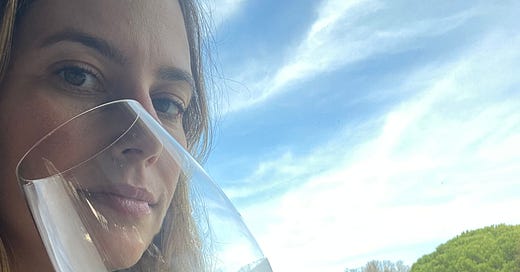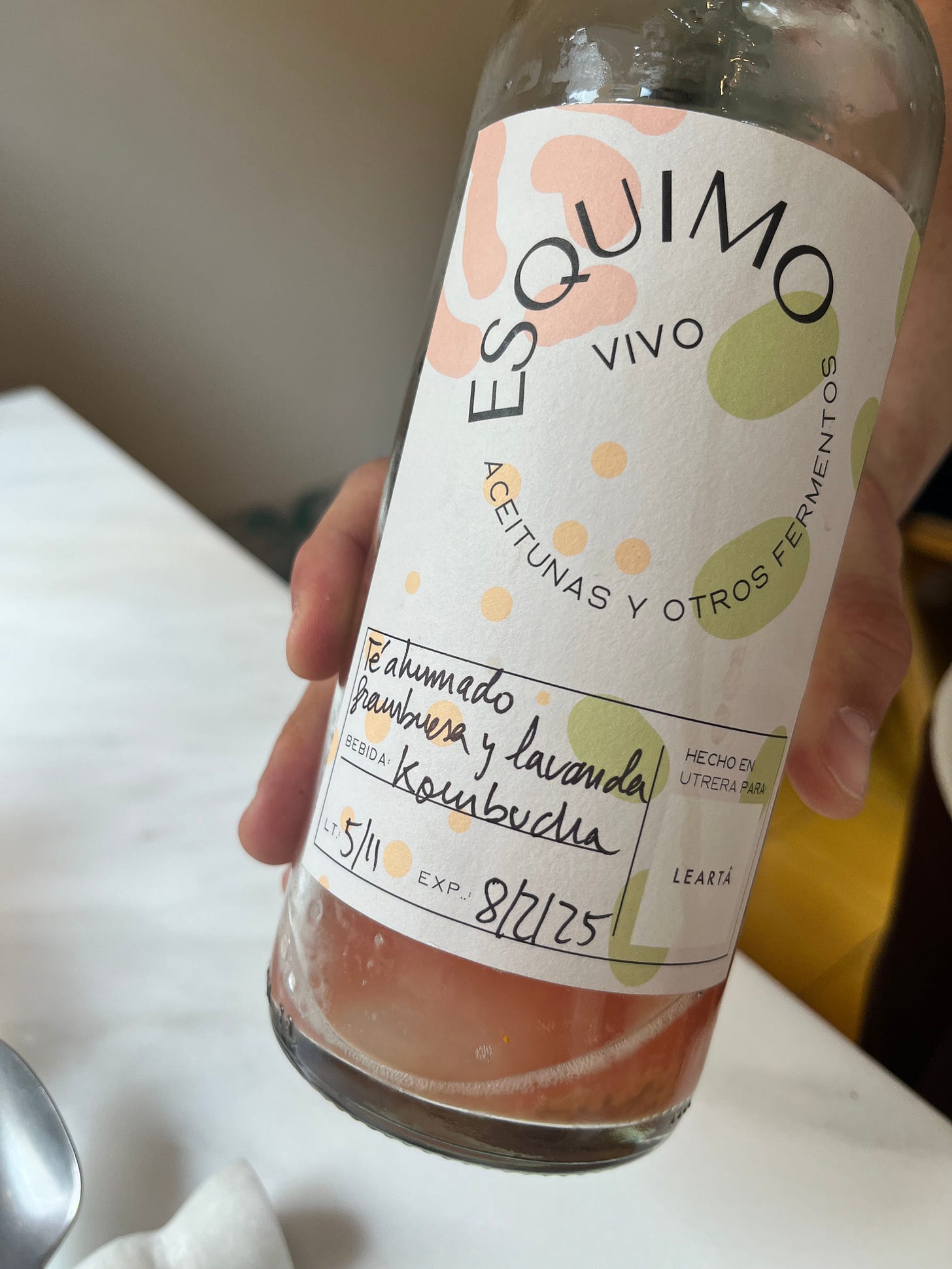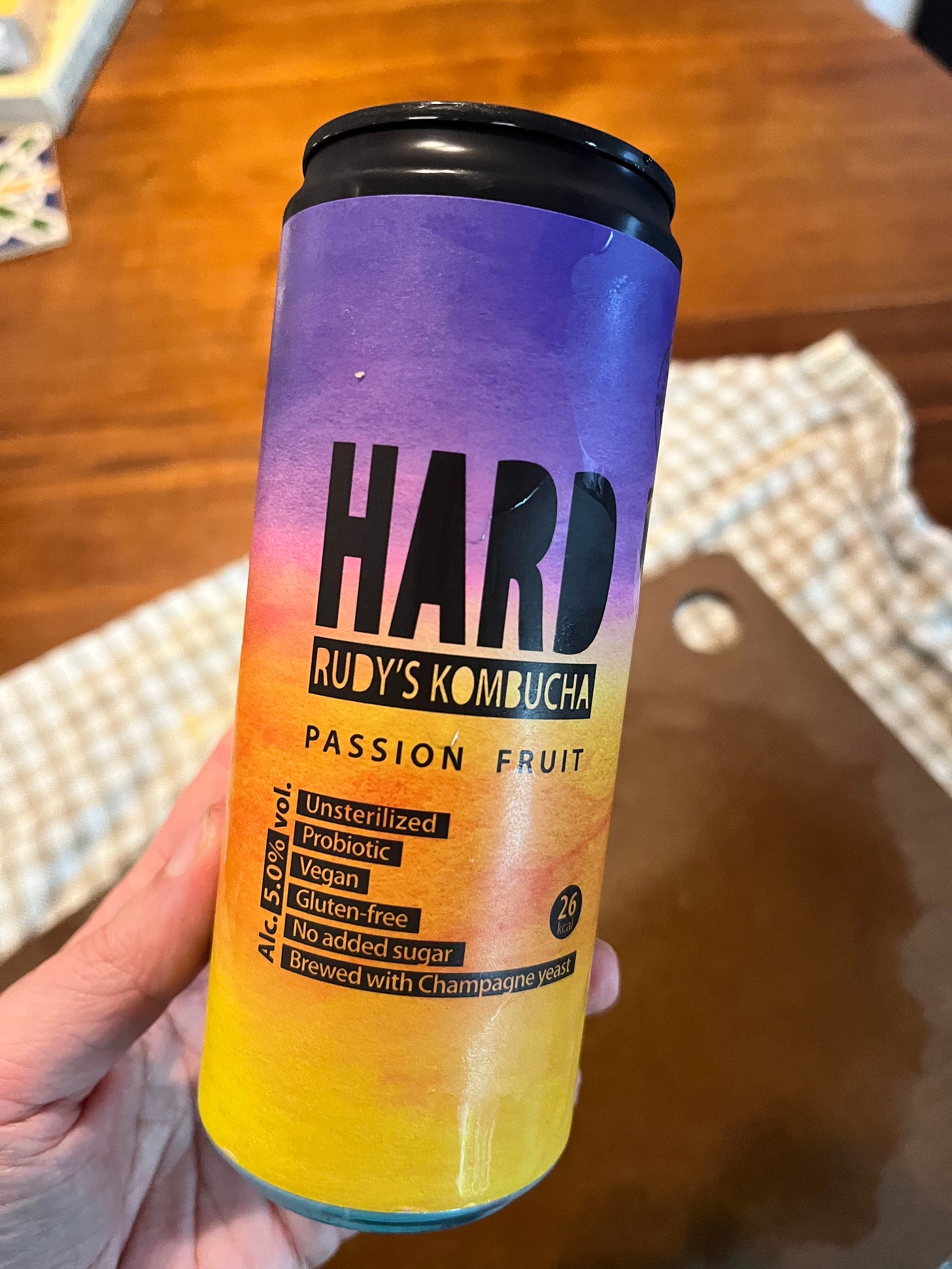The Lancet Study: Alcohol
Alcohol is unsafe to drink. Drink at your peril, but allow us customers the choice of alternatives other than plain water
In general
My thesis is that all that “natural wines” movement - the consumer one, not the producers - is just a precursor of a slow abandonment of wine as a preferred beverage of choice.
Most of these new wines are, in fact, more similar to a kombucha than to traditional wine - if the standard for wines is Parker’s big, round and oaky.
Some natural wines proudly sported some scoby—I still remember with sheer horror a bottle of Serradinha that was served to me at Prado restaurant once. Back then, I was a drinker of classical wines—think Bordeaux, Bourgogne, Barolo, and Brunello. That wine tasted of mild vinegar, and it struck me as something completely different.
With time, I tasted more and more “natural wines” of various degrees of clearness, scabies, and pleasure. In my head, I always thought that all those obsessed with a certain kind of avant-garde natural wines did not like wine “the beverage”. They wanted the idea of sipping something with friends at a French boho chic bistro, perhaps something that made their heads slightly lighter.
The more I drank natural wines, the less I wanted to drink regular wines - to the point that today, I do not want to consume this kind of old style wine, and it is sometimes tough for me even to drink something pleasurable and round like a too complicated Barolo.
And the more I drank natural wines, the less I drank wines.
I realised I drink when there is a bottle on the table and when said bottle is poured into my glass. If there is a bottle on the table and I am left to my devices, I will unlikely pour it into my glass more than once.
Sobreliers
Whilst some Italian sommelier wished me to die (seriously) when I pointed out alcohol is bad and the category should be better educated on the risks and suitable alternatives, some others are pushing the boundaries of what we call “wine pairing”.
Let me be very clear.
I hate wine pairings.
I loathe being pushed someone’s vision on a meal and given a little drop of something to pair with something—most of the time, it does not bring me any joy, as Marie Kondo would say.
However, I am very much interested in non-alcoholic wine pairings.
Broths? Infusions? Teas? Kombuchas? Kefir? BRING THEM ON! Alcohol takes away rather than adds to a meal. And if I am at a restaurant, I am there primarily to eat.
If I had wanted to drink, I would have had an aperitivo or eaten at a wine bar.
I love how you could pair a vegetable broth with a plate or exalt some features of a course via the tanginess of kombucha, the tannins of tea, or even coffee.
Unfortunately, non-alcoholic alternatives are hardly ever offered as standalone drinks—while you can generally have wine by the glass, you cannot frequently have “whatever concoction the sobrelier came up with” by the glass. And that is such a pity because I would pay for it. Instead, I am stuck with either plain water or with the need to get at least one glass of wine to feel different from a teething toddler.
There are non-alcoholic pairings, but not all the time I want to drink THAT MUCH. So I am forever grateful for those places that feature single-order drinks like kombucha, available by the glass - or the can.
La Vanguardia
Estanislau Serrano is a young and promising journalist, who happens to be one of
’s talented pupils at La Vanguardia, one of the most relevant Spanish newspapers.In January, Estanislau published a super thorough article about the new tendencies in drinking in Spain. I had the pleasure of talking with him about the article, and so did our fellow sommelier and noir writer
, whom he interviewed on the matter:“It is important to take into account people who for some reason do not want to drink alcohol, although pairing wine with non-alcoholic drinks is also interesting,” the sommelier clarifies. Regarding non-alcoholic beverages, Silva believes that there are wineries “with a lot of work behind them” that work “very well” with their non-alcoholic varieties. “A meal can also be paired with a combination of flavours of other elements such as an extract of flowers, fruits, vegetables, broths, infusions”. However, “although there is great involvement in research and R&D, it is very difficult for these wines to reach the trajectory and work of so many years of history and culture that wine has.”
I had a lot of fun and pleasure in exchanging ideas with Estanis, and I told him:
“some sommeliers tend to be reluctant to design mixed pairings with non-alcoholic drinks.” That is why this custom “mostly happens” in Mediterranean countries, where “a large part of abstemious people”, have experienced the situation of having to pour a glass of wine and wet their lips at the insistence of some companions at the meal. This is due to the “cultural heritage” of so many years of knowledge and tradition rooted in the consumption of wine. “The more knowledge sommeliers have, the more open they are to new alternatives to alcohol.”
The Lancet Studies
No level of alcohol consumption is safe when it comes to human health. The data behind this dire WHO warning come from a 2021 study that estimated the number of incident cancers attributable to alcohol consumption in the EU in 2017—light to moderate drinking (1–2 drinks per day) was responsible for 23,300 new cases of cancer. Source: Lancet
Alcohol, as classified by the International Agency for Research on Cancer, is a toxic, psychoactive, and dependence-producing substance and a Group 1 carcinogen that is causally linked to seven types of cancer, including oesophagus, liver, colorectal, and breast cancers. Alcohol consumption is associated with 740000 new cancer cases each year globally. Source: Lancet Oncology
Globally, an estimated 741 300 (95% UI 558 500–951 200), or 4·1% (3·1–5·3), of all new cases of cancer in 2020 were attributable to alcohol consumption. Males accounted for 568 700 (76·7%; 95% UI 422 500–731 100) of total alcohol-attributable cancer cases, and cancers of the oesophagus (189 700 cases [110 900–274 600]), liver (154 700 cases [43 700–281 500]), and breast (98 300 cases [68 200–130 500]) contributed the most cases. Source: Lancet Oncology
33% of men drank alcohol most weeks. In conventional observational analyses, ex-drinkers, non-drinkers, and heavy drinkers had higher risks of death from most major causes than moderate drinkers. Among current drinkers, each 100 g/week higher alcohol intake was associated with higher mortality risks from cancers (HR 1·18 [95% CI 1·14−1·22]), cardiovascular disease (CVD; HR 1·19 [1·15−1·24]), liver diseases (HR 1·51 [1·27−1·78]), non-medical causes (HR 1·15 [1·08−1·23]), and all causes (HR 1·18 [1·15−1·20]). Source: Lancet Public Health
The conclusions of the study are unambiguous: alcohol is a colossal global health issue and small reductions in health-related harms at low levels of alcohol intake are outweighed by the increased risk of other health-related harms, including cancer. The findings have further ramifications for public health policy and suggest that policies that operate by decreasing population-level consumption should be prioritised. Source: Lancet
Interesting readings:
On becoming sober, by
:I'm not mad at anyone, believe me, I don't want to create an extremist cult, everyone can become part of it with their own differences (or normality, it's not up to me to judge), I'm just convinced that the existence of choices and alternatives can positively influence the personal growth of each of us. If you become an adept at kombuchanism, I don't want you to have to stop drinking alcohol, stop smoking, or stop eating meat. I just want you to be able to appreciate the diversity of offers you can find on the market. Just as kombucha is a bit of tea, a bit of an aperitif, and a bit of a drink, our search for novelty can also be fun without forcing us to choose between black and white.
Another bullet to my thesis that natural-wines-drinkers in reality do not like wine and would rather be drinking kombucha, comes from the newsletter by
:After years of speculation about what causes natural wine fans to suffer from headaches, the shocking truth will be revealed in 2025: it is not sulphites, biogenic amines or the lecture from the sommelier before they open your bottle. Natural wines will be proven by new evidence to contain a poison called alcohol.
At least 7 cancers are directly associated with the consumption of alcohol, including some of our commonest such as breast and bowel cancer. Alcohol-related cancers account for around 5% of all cancers. Alcohol use is also likely to be part of the reason why cancer rates are rising in young people, under the age of 50 years.
The key message for 2025 is that there is no safe limit of alcohol to consume, especially when it comes to cancer risk. Healthcare professionals need to be clear that zero is the safest amount.














Thanks for the mention! I’d say what I wrote sounds pretty cool in English!
I'm so over wine lately. I make my own kombucha, I flavor my sparkling water with lacto-fermented fruits juice I make at home. I love a chino.